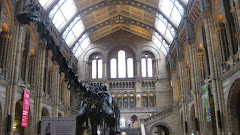Saturday, 25 July 2009
Natural Theology and Natural Selection
There is an immense appeal of this world-view, that all nature is in fact not really “natural” at all, but a work of art constructed for our use by a benevolent Father, a work that we can study, as we would a painting, to better understand the Artist. William Paley (1743-1805) wrote his Natural Theology; or, Evidence of the Existence and Attributes of the Deity (1802) at a time when doubt of the complete harmony between Scriptures and science began to waft over the Channel and down from the Scottish highlands. With this threat of secular science, Paley felt the need to open his defense of natural theology with a logical argument for the existence of God. He first generalizes the following: if all the interdependent parts of a watch are the product of a watchmaker, then everything with parts that work together must have a maker. If everything with interdependent parts has a maker and if living beings have interdependent parts, then living beings must have a maker—God. Aside from his first generalization, going from watches to the entire natural world, Paley’s logic is sound. This argument can be even readapted to advances in science, by saying that God used natural laws like gravity or evolution as a means to create a smoothly ordered solar system or the huge diversity of living beings. Darwin uses this idea to introduce On the Origin of Species, in an epigraph from William Whewell’s Bridgewater Treatise: “events are brought about not by interpositions of Divine power, exerted in each particular case, but by the establishment of general laws.” For Darwin, his law of natural selection is to be just another of these general laws of nature established by God. Why then does natural selection spur so much religious worry and doubt? Because, if natural selection is seen in the light of natural theology, as a way to understand our Creator through his creation, then God is suddenly no longer a benevolent Artist and Father but a cold and distant Deity, who uses struggle, suffering, death, and waste to effect his creation. But then again, the new discordance that “survival of the fittest” brought to the harmony between science and religion may not be so new after all. Reconciling the incredible beauty and order of the natural world with “nature red in tooth and claw,” has always been difficult, so having problems reconciling a loving God and His harsh means of creation seems, well, only natural.
Subscribe to:
Post Comments (Atom)

No comments:
Post a Comment